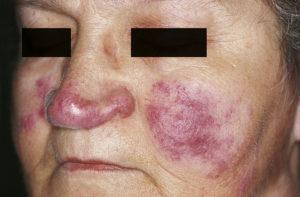
Cutaneous lesions of sarcoidosis (M. Sand, D. Sand, C. Thrandorf, V. Paech, P. Altmeyer, F. G. Bechara; Wikimedia Commons)
Cutaneous sarcoidosis occurs in up to 30% of individuals with sarcoidosis. The use of anti-tumor necrosis factor (TNF)-α agents has not been fully assessed for this condition. Therefore, researchers from France tested the efficacy and safety of these agents in 46 participants with cutaneous sarcoidosis. They found that anti-TNF-α agents were effective in the treatment of cutaneous sarcoidosis, however the rate of relapse was high when treatment was stopped.
Cutaneous sarcoidosis usually manifests in two categories. Either sarcoidosis-specific lesions which are characterized by granulomatous infiltrates present on the skin or by lesions which are non-specific and due to the activated immune response; an example being erythema nodosum. Treatments for cutaneous sarcoidosis include topical corticosteroids and antibiotics. These treatments are not usually effective in treating the condition and therefore new therapies are needed.
TNF-α is a pro-inflammatory cytokine which has been implicated in sarcoidosis. TNF-α secreted by macrophages has been shown to aid in the development and maintenance of sarcoidosis granulomas. Therefore, targeting TNF-α may be effective in treating the condition. The researchers investigated the efficacy and safety of anti-TNF-α agents specifically in the treatment of cutaneous sarcoidosis.
46 patients in their multi-center cohort has cutaneous sarcoidosis. Their median age was 50 (14-78) years and 72% were women. 93% of the patients were given anti-TNF-α agents because they either had treatment failure or adverse events from their prior treatments. 24% of the participants had adverse events following anti-TNF-α treatment and had to discontinue treatment. Overall, the response rate to treatment was 79% after 12 months. Relapses 18 months after stopping treatment occurred in 44% of the patients. Some participants relapsed during treatment which could mostly be attributed to treatment tapering.
In summary, this study found that the use of anti-TNF-α treatment is effective and relatively safe to use in individuals with cutaneous sarcoidosis. However, the cohort size was small and therefore, larger, more diverse cohorts should be tested.
Journal article: Heidelberger et al., 2017. Efficacy and Tolerance of Anti–Tumor Necrosis Factor α Agents in Cutaneous Sarcoidosis: A French Study of 46 Cases. JAMA
Article by Thandeka Moyo











